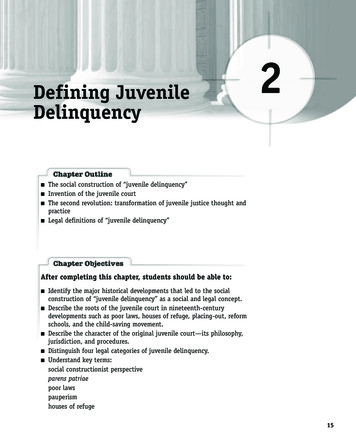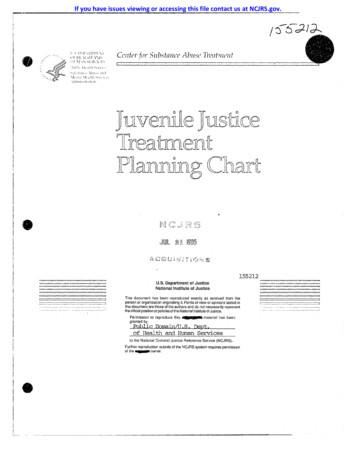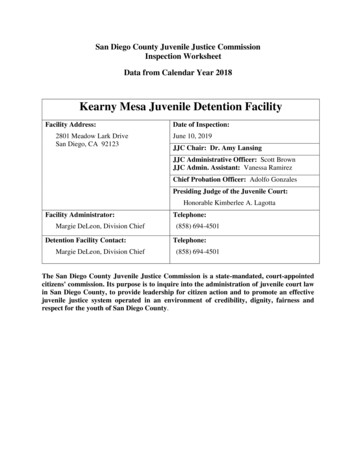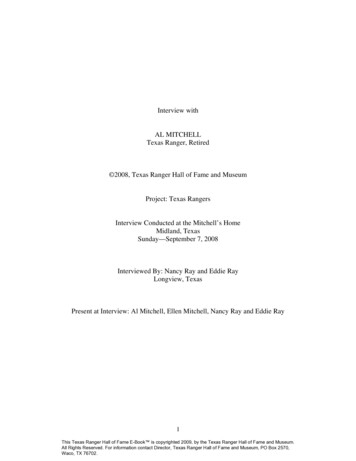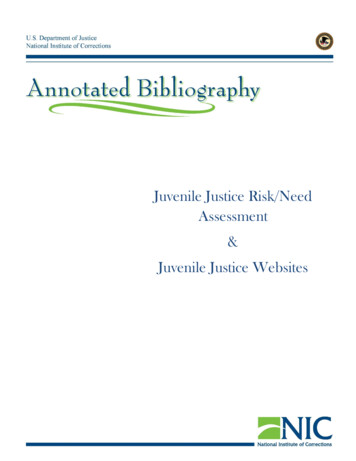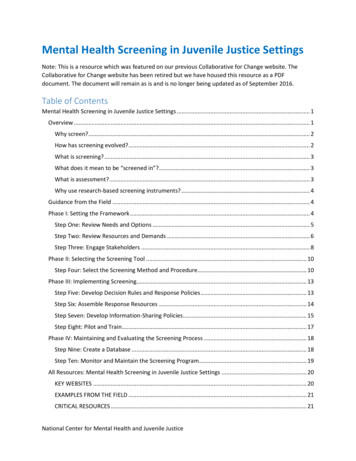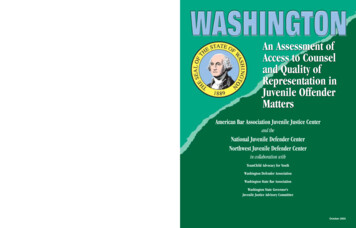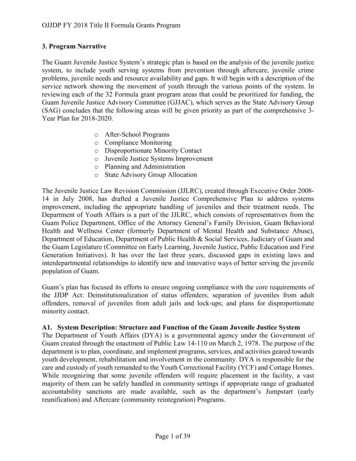
Transcription
DeterminateSentencingRyan J. MitchellP.O. Box 1570Houston, Texas 77251-1570Phone: 832.534.2542Fax: 832.369.2919Email: DATAHISTORYYou have to know the past to understandthe present – Carl Sagan1
Created in 1987Determinate Sentencing StatuteCreated as an alternative to lowering the age forcertification eligibilityMaximum Sentence set at 30 years (reserved for Capitaland first degree felonies)Six eligible offense (Capital Murder, Murder, attemptedCapital Murder, Aggravated Kidnapping, AggravatedSexual Assault or Deadly Assault on a Law EnforcementOfficerMaximum age of jurisdiction was 21 in juvenile courtsystemTransferred to adult prison by age 18Legislative Changes in 1991Forty years for most serious offenses (Murder, CapitalMurder, aggravated controlled substances felony)1995 Legislative ChangesEleven new offenses which brought the total to thirty(including attempt level offenses)Eliminated transfer hearings regarding transfer before theminimum length of incarceration was reachedMinimum length of incarceration was ten years for acapital felony, three years for a first degree felon, twoyears for a second degree felony and one year for a thirddegree felonyMaximum ranges of punishment were also set at amaximum of ten years for third degree felonies, twentyyears for second degree felonies, and forty years for firstdegree felonies and capital murder2
Legislative Changes in 2001Two new offenses were addedLatest Legislative ChangesIn response to widespread abuse within the Texas JuvenileJustice Department (Formally Texas Youth Commission)Maximum age of jurisdiction was reduced from agetwenty-one to age nineteen.If a juvenile had not successfully served the sentenceimposed and had not been transferred to the adult systemthe juvenile was transferred to adult parole supervision on19th birthdayWhere to Find it3
PROCEDUREPROCEDURE OUTLINEFILE THE CASEHEARINGPOST-ADJUDICATIONHOW TO FILE THE CASEThe State has essentiallyunfettered discretionBleys v. StateIn the Matter of S.B.CMust present the case toGrand Jury4
ELIGIBILITYCapital MurderAggravated AssaultAttempted Capital MurderAggravated RobberyMurderAttempted AggravatedRobberyAttempted MurderManslaughterIntox ManslaughterAggravated KidnappingAttempted AggravatedKidnappingAggravated Sexual AssaultSexual AssaultAttempted Sexual AssaultHabitual Felony ConductFelony Injury CasesFelony Deadly ConductAggravated ControlSubstances FeloniesSecond Degree felonyindecency with a childCriminal SolicitationFirst Degree Felony ArsonCriminal ConsipracyRestrictionProsecuting attorney maynot refer a petition thatalleges the child engagedin conduct that violatedSection 22.011(a)(2), PenalCode, or Sections22.021(a)(1)(B) and (2)(B),Penal Code, unless thechild is more than threeyears older than the victimof the conductGrand JuryAt least 9 out of the 12members must approvethe petitionApproval must be sent tothe juvenile court andentered into the recordState may waivedeterminate petitionJuvenile and attorney canwaive grand jurypresentment5
HEARINGMust be 12 jurors on the juryJuvenile has a right to have the jury determine sentenceRequest for jury sentencing must be in writingWritten request must be filed before the start of voir direJuvenile court referees, associate judges, or constitutionalcounty judges are prohibited from hearing a determinatepetitionDispositionPROBATIONTEXAS JUVENILE JUSTICEDEPARTMENT6
PROBATIONSentence must be 10 years or lessProbation must be awardedJudge assess the length of theprobation and conditionsBegin at home or in the care of theChief Juvenile Probation OfficerJudge shall make a finding that it isin the child's best interests to beplaced outside the child's home;reasonable efforts were made toprevent or eliminate the need forthe child's removal from the child'shome and to make it possible forthe child to return home; and thechild, in the child's home, cannotbe provided the quality of careand level of support andsupervision that the child needs tomeet the conditions of probation.SUPERVISION and DISCHARGESupervised by Juvenile ProbationJurisdiction terminates at either 18 or 19 (2011)State may petition to transfer supervision if probation is notfinishedHearing must be requested and completed before agingoutIf discharged, discharge date is enteredJuvenile released on discharge dateSUPERVISION and TRANSFERAt hearing the judge may transfer the supervision of thejuvenile to an appropriate adult district courtTransfer happens on 19th Birthday (18 if before 2011)Only the petition, the grand jury approval, the judgmentconcerning the conduct for which the person was placedon determinate sentence probation, and the transfer orderare a part of the district clerk's public recordMinimum requirements for adults are not required fortransferred juvenilesConditions of adult court must be consistent with thejuvenile court conditionsViolations are handled as adults with no minimumrestrictions7
TEXAS JUVENILE JUSTICEDEPARTMENT OUTLINERESTRICTIONSPAROLETRANSFER TO ADULTSYSTEMRESTRICTIONSMINIMUM STAYS10 years – Capital Felony3 years – First Degree Felony2 years – Second Degree Felony1 year – Third Degree FelonyMAXIMUM SENTENCE40 years – Capital Felony, First Degree, AggravatedControlled Substances Felony20 years – Second Degree Felony10years – Third Degree FelonyPAROLEPrior to reaching age 19 theTexas Juvenile JusticeDepartment may elect toparole the juvenileJuvenile must serve theminimum sentenceIf paroled prior to 19,supervised by the TexasJuvenile Justice DepartmentAutomatically transferred toadult parole system at 19thbirthday8
TRANSFER TO ADULT PRISONAfter juvenile turns 16 but before juvenile turns 19Court of original jurisdictionJuvenile entitled to an attorneyAttorney entitled to access to all evidenceMust be recorded and recording retained for 2 yearsNotice of the time and place of the hearing must begiven to the guardian, the juvenile, prosecutingattorney, victim and any other person who has filed awritten requestCourt may consider written reports from probationofficers, professional court employees, professionalconsultants, or employees of the Texas YouthCommission, in addition to witnessesTRANSFER BURDENIn order to satisfy the transfer of the juvenile into the adultsystem the commission must show that the child has notcompleted the sentence and the child's conduct indicatesthat the welfare of the community requires the transferTexas Human Resource Code 61.079DATA9
CASE BREAKDOWN250216200200187175174150119 12CertificationsCASE cationsThank YouDeterminate SentencingRyan J. MitchellP.O. Box 1570Houston, Texas 77251-1570Phone: 832.534.2542Fax: 832.369.2919Email: ryanjmitchell.law@gmail.com10
DETERMINATE SENTENCING29TH Annual Juvenile Law ConferenceSan Antonio, TexasFebruary 22, 2016Ryan J. Mitchell, Attorney at LawP.O. Box 1570Houston, Texas 77251-1570Phone: 832.534.2542Fax: 832.369.2919Email: ryanjmitchell.law@gmail.com
ContentsIntroduction . 1History . 1Procedure under Determinate Sentencing . 3Grand Jury . 3Hearing . 3Probation . 3Texas Juvenile Justice Department . 5Parole . 5Transfer to Adult Prison . 5Conclusion . 6
also forced the courts to certify juveniles aboutto age out of the system because there was noalternative. This began to conflict with therehabilitation purpose of the Juvenile JusticeCode.4In response to this dilemma,Determinate Sentencing was created by theTexas Legislature in 1987 with the passing ofthe Texas Determinate Sentencing Act.5 Underthe Texas Determinate Sentencing Act juveniles,between ages ten through sixteen, who hadcommitted Capital Murder, Murder, attemptedCapital Murder, Aggravated Kidnapping,Aggravated Sexual Assault or Deadly Assault ona Law Enforcement Officer were eligible forDeterminate Sentencing.6 The maximumsentence was thirty years.7 The Texas YouthCommission would house the juvenile but couldpetition the court at any time to parole thejuvenile.8 If the juvenile was not paroled, amandatory hearing in the Juvenile Court wasrequired upon the juvenile reaching seventeenand one-half years old.9 The court would makethe decision to either transfer the juvenile tothe Texas Department of Criminal Justice to betreated as an adult, or parole the juvenile fromthe Texas Youth Commission.10 If the juvenilewas paroled from the Texas Youth Commission,the juvenile was to remain on parole until thefull sentence was served, the court dischargedthe juvenile or the juvenile reached the age oftwenty-one.11The next change enacted by thelegislature happened in 1991.12 The legislatureincreased the maximum sentence to forty yearsif the juvenile was sentenced underIntroductionDeterminate sentencing is a hybridsystem that allows a juvenile court to maintaincontrol of a juvenile charged with a seriouscrime, while at the same time fulfilling thepurpose of the Juvenile Justice Code. Thepurpose of the Juvenile Justice Code is toremove, where appropriate, the taint ofcriminality from children committing certainunlawful acts and to provide treatment, trainingand rehabilitation that emphasizes theresponsibility of both the parent and the childfor the child’s conduct.1When the courts proceed under anIndeterminate Petition, the juvenile can onlyutilize the rehabilitation programs available tothe Juvenile Justice System until the juvenileages out of the system. The certification processmoves the juvenile immediately into the adultsystem, bypassing the programs within theJuvenile Justice System structure. By contrast,Determinate sentencing is the hybrid solutionthat offers the Juvenile Courts an attempt torehabilitate the Juvenile and transfer theJuvenile to the adult system only if it becomesnecessary.HistoryPrior to 1987, the State of Texas wasgiven jurisdiction over a juvenile until thejuvenile turned twenty-one.2 A juvenile couldnot be certified if the child had not reached theage of 15.3 This created a void for juvenilescharged with serious crimes, that could not becertified or certification was unwarranted. It16Tex. Fam. Code Sec. 51.01Dawson, Texas Blended Sentencing: An EmpiricalStudy of the Uses of Determinate Sentencing, 17State Bar of Texas Section Report Juvenile Law 5-17(No. 2, June 2003).3Tex. Fam. Code 54.024Tex. Fam. Code Sec. 51.015Dawson, Texas Blended Sentencing: An EmpiricalStudy of the Uses of Determinate Sentencing, 17State Bar of Texas Section Report Juvenile Law 5-17(No. 2, June 2003).Advances in Criminological Theory, Volume 8: TheCriminology of Criminal Law edited by William S.Laufer and Freda Adler7Id.8Id.9Id.10Id.11Id.12Lost Causes: Blended Sentencing. Second Chances,and the Texas Youth Commission by Chad R. Trulson,Darin R. Haerle, Jonathan W. Caudill, Matt DeLisi andJames W. Marquart21
Determinate Sentencing for committing CapitalMurder, Murder or an aggravated controlledsubstances felony.13Four years later in 1995 the legislatureacted again. The legislature added eleven newoffenses which (including attempting to committhe crime) brought the total of criminal offenseseligible for determinate sentencing to thirty.14In addition to adding to the list of eligibleoffenses, the legislature also eliminated transferhearings unless the Texas Youth Commissionrequested the transfer of a youth to the TexasDepartment of Criminal Justice or the TexasYouth Commission wanted to parole a juvenilebefore the minimum length of incarcerationwas reached. The minimum length ofincarceration was ten years for a capital felony,three years for a first degree felony, two yearsfor a second degree felony and one year for athird degree felony.15 Maximum ranges ofpunishment were also set at a maximum of tenyears for third degree felonies, maximumpunishment of twenty years for second degreefelonies, and a maximum punishment of fortyyears for first degree felonies and capitalmurder.16In 2001 two new offenses were addedto bring the total list of offenses to include: Murder Attempted Murder Capital Murder Attempted Capital Murder Manslaughter Intoxication Manslaughter Aggravated Kidnapping Attempted Aggravated Kidnapping Aggravated Sexual Assault Sexual Assault Attempted Sexual Assault Aggravated Assault Aggravated Robbery Attempted Aggravated RobberyFelony Injury (Child, Elderly, orDisabled) Felony Deadly Conduct Aggravated First-Degree ControlledSubstance Felony Criminal Solicitation of a Capital or FirstDegree Felony Second Degree Felony Indecency with aChild Attempted Indecency with a Child byContact Criminal Solicitation of a Minoro To commit Indecency with aChildo To commit Sexual Assaulto To commit Aggravated SexualAssaulto To commit Sexual Performanceby a Child First Degree Aarson Habitual Felony Conduct (3 consecutiveFelonies) First Degree Arson Felony Deadly Assault – Discharge of aFirearm; and Aggravated Controlled SubstanceFelony17Another change with regards todeterminate sentencing came in 2007. Thelegislature changed the maximum age ofjurisdiction from age twenty-one to agenineteen. The legislature also provided thatif a juvenile had not successfully served thesentence imposed and had not beentransferred to the adult system, the juvenilewas transferred to adult parole supervisionupon reaching the age on ntenced offenders16Tex. Fam. Code 54.04Lost Causes: Blended Sentencing. Second Chances,and the Texas Youth Commission by Chad R. Trulson,Darin R. Haerle, Jonathan W. Caudill, Matt DeLisi andJames W. Marquart18Id.142
HearingProcedure under DeterminateSentencingAs with all juvenile cases, the hearingconsists of an adjudication hearing (determiningif it is true or not true that the juvenile engagedin delinquent conduct and is in need ofrehabilitation or supervision) and a dispositionhearing (determining the sentence).Any judge granted jurisdiction overjuvenile cases may preside over anindeterminate petition. The amount of jurorshearing the evidence under an indeterminatepetition is dependent on if the County Court orDistrict Court is granted jurisdiction over thejuvenile cases. The juvenile has no right to havea jury handle the disposition hearing under andindeterminate petition.26These rules change if the state isproceeding under a properly approvedDeterminate Petition. First, the amount ofjurors hearing the case must be twelveregardless of what court has jurisdiction.27Second, the juvenile has a right to have the jurydetermine the sentence.28 The attorney for thejuvenile must file a written request in order toelect the jury to determine sentencing.29 Thewritten request must be filed before the start ofvoir dire.30 Third, there is a restriction on whattype of judge may preside over the determinatecase. Only the elected official may preside overthe hearings.31 Juvenile court referees,associate judges, or constitutional countyjudges are prohibited from hearing adeterminate petition.32 Other than these keydifferences, the indeterminate petitionproceedings and determinate petitionproceedings, remain virtually the same.In certification hearings, after theprosecutor selects to file the CertificationPetition, discretion is left to the Juvenile Judgeto determine if certification is warranted. This isaccomplished by presenting evidence at ahearing.19 Determinate sentencing places a vastmajority of the discretion in the hands of theprosecutor at the initial stages of theprocedure.20 The judge and state organizationsare not granted discretion until postadjudication.21Grand JuryIf the prosecution elects to proceedunder the Determinate Sentencing statute, thecase must be presented to the grand jury.22 Atleast nine members of the grand jury mustapprove the Determinate Petition.23 This is theonly check and balance against totalprosecutorial discretion.If at least nine members approve theDeterminate Petition, the approval of thepetition shall be certified to the juvenile courtand the approval shall be entered in the recordof the case.24 The certification of the approvalby the grand jury gives the juvenile court thejurisdiction to proceed under the DeterminateSentencing statute. However, the respondentand the attorney do have the right to waivegrand jury approval.If nine members fail to approve thedeterminate petition, the state cannot proceedunder the determinate sentencing statute.25The state may proceed with an indeterminatepetition or certify the juvenile if appropriate.ProbationAfter the juvenile is found to haveengaged in delinquent conduct and is in need of19262027Tex. Fam. Code 54.02Tex. Fam. Code 53.04521Tex. Hum. Res. Code 61.079; Tex. Hum. Res. Code61.08422Tex. Fam. Code 53.045; Tex. Fam. Code 54.0423Tex. Fam. Code 53.04524Id.25Id.Id.Tex. Fam. Code 54.0328Tex. Fam. Code 54.0429Id.30Id.31Tex. Fam. Code 54.10; Tex. Fam. Code 51.0432Id.3
rehabilitation or supervision the juvenile issentenced. The juvenile may either besentenced to a term of years in the TexasJuvenile Justice Department or may be placedon probation.During the disposition hearing, thejudge or jury may elect to place the juvenile onprobation.33 First, the juvenile must besentenced to ten years or less.34 Second, thejudge or jury must award probation to thejuvenile.35 If the juvenile is placed on probationby the judge or jury, the juvenile can beginprobation either at home or in the care of theChief Juvenile Probation Officer.36 If the judgeplaces the juvenile outside of the home, thejudge shall make a finding that it is in the child'sbest interests to be placed outside the child'shome; reasonable efforts were made to preventor eliminate the need for the child's removalfrom the child's home and to make it possiblefor the child to return home; and the child, inthe child's home, cannot be provided thequality of care and level of support andsupervision that the child needs to meet theconditions of probation.37Just as with adult cases, if the juvenile isplaced on probation the terms and conditionsof probation are assessed by the judge.38 Thejudge assess the length of the probation andwhat services the juvenile will be ordered toattend.39Juvenile probation will begin thesupervision of a juvenile that is awardedprobation. Currently, juvenile probation hasjurisdiction over to the juvenile until thejuvenile’s nineteenth birthday.40 If the offensewas committed prior the September 1, 2011,juvenile probation has jurisdiction over thejuvenile until the juvenile’s eighteenthbirthday.41Prior to the juvenile reaching agenineteen, if the juvenile has not completedprobation, the state may petition the court totransfer the juvenile’s supervision to an adultdistrict court. The juvenile will be dischargedfrom probation If the request is not made andthe hearing is not completed before thejuvenile’s nineteenth birthday.If the court determines to discharge thejuvenile from probation, the court enters thedischarge date into the record.42 The dischargedate must be on or before the juvenile’snineteenth birthday.43 Once this date occurs,the juvenile is discharged from probation.44The judge may also elect to transfer thesupervision of the juvenile to an appropriateadult district court. If this occurs, the juvenile istransferred to adult supervision on thejuvenile’s nineteenth birthday. Upon transfer toan adult court only the petition, the grand juryapproval, the judgment concerning the conductfor which the person was placed ondeterminate sentence probation, and thetransfer order are a part of the district clerk'spublic record.45 The minimum requirements foradults are not required for juveniles that aretransferred into the adult court.46 Also the adultcourt may only order conditions of probationsthat are consistent with the juvenile courtconditions.47If a juvenile violates the conditions ofprobation after transfer to an adult court, thedistrict court shall dispose of the violation in thesame manner as if the court had originallyexercised jurisdiction over the case.48 However,the judge is not bound by the minimumrequirements set out for adults.4933423443Tex. Fam. Code 54.04Id.35Id.36Id.37Tex. Fam. Code 54.05(m)38Id.39Id.40Tex. Fam Code 54.05141Id.Tex. Fam. Code 54.051(c)Id.44Id.45Tex. Fam. Code 54.051(d-1)46Tex. Fam. Code 54.051(e-1)47Tex. Fam. Code 54.051(e-2)48494Tex. Fam. Code 54.051(e-2)
child becomes nineteen years of age, thecommission may refer the child to the juvenilecourt that entered the order of commitment forapproval of the child's transfer to the TexasDepartment of Criminal Justice forconfinement.60 In order to satisfy the transfer ofthe juvenile into the adult system thecommission must show that the child has notcompleted the sentence and the child's conductindicates that the welfare of the communityrequires the transfer.61Before the transfer hearing takes placeproper notice of the time and place of thehearing must be given to the person to betransferred or released under supervision, theparents of the person, any legal custodian ofthe person, including the Texas YouthCommission, the office of the prosecutingattorney that represented the state in thejuvenile delinquency proceedings, the victim ofthe offense that was included in the delinquentconduct that was a ground for the disposition,or a member of the victim's family, and anyother person who has filed a written requestwith the court to be notified of a releasehearing with respect to the person to betransferred or released under supervision.62 Thehearing is not invalid if it is shown on the recordthat a person requiring notice is unable to belocated and reasonable efforts were used toattempt to locate the party.63At the transfer hearing the court mayconsider written reports from probationofficers, professional court employees,professional consultants, or employees of theTexas Youth Commission, in addition to thetestimony of witnesses.64 The court shallprovide the attorney for juvenile with access toTexas Juvenile Justice DepartmentIf the judge or the jury do not awardprobation, the juvenile is transferred to theTexas Juvenile Justice Department for a certainnumber of years. As discussed earlier in thispaper, the minimum stay for a Capital Murder isten years.50 The minimum stay for first degreefelonies is three years.51 The minimum stay forsecond degree felonies is two years.52 For thirddegree felonies the minimum stay is one year.53As discussed earlier in this papermaximum sentences also apply. The maximumpenalty for a capital degree felony, felony in thefirst degree, or an aggravated controlledsubstance felony is not more than forty years.54For a second degree felony the maximumpunishment is not more than twenty years.55For a third degree felony the maximum penaltyis not more than ten years.56ParolePrior to the juvenile reaching the age ofnineteen, the Texas Juvenile Justice Departmentmay elect to parole the juvenile. The onlyrestriction is that the juvenile cannot be paroleduntil the juvenile has served the minimumsentence with respect to the adjudicatedoffense.57 If the juvenile is paroled prior toreaching the age of nineteen, the Texas JuvenileJustice Department will supervise the juvenile.58Upon reaching the age of nineteen the juvenilewill be automatically transferred to adult parolesystem to serve the rest of the sentence.59Transfer to Adult PrisonIf the juvenile is not discharged orparoled, the juvenile may be transferred to theadult prison system. When the juvenilebecomes sixteen years of age but before the50585159Tex. Hum. Res. Code 61.081Id.52Id.53Id.54Tex. Fam. Code 54.04(d)(3)(a)55Id.56Id.57Tex. Hum. Res. Code 61.081Tex. Hum. Res. Code 61.084Id.60Tex. Hum. Res. Code 61.07961Id.62Tex. Fam. Code 54.1163Id.645
all written matter to be considered by thecourt.65At the hearing, the juvenile is entitledto an attorney.66 The hearing must be recordedby a court reporter or by audio or video taperecording, and the record of the hearing mustbe retained by the court for at least two yearsafter the date of the final determination on thetransfer or release of the juvenile.67 At thehearing the court may consider the experiencesand character of the juvenile before and aftercommitment to the youth commission, thenature of the penal offense that the juvenilewas found to have committed, the manner inwhich the offense was committed, the abilitiesof the juvenile to contribute to society, theprotection of the victim of the offense or anymember of the victim's family, therecommendations of the youth commission andprosecuting attorney, the best interests of thejuvenile, and any other factor relevant to theissue to be decided.68ConclusionDeterminate sentencing was created in1987 to address the void betweenindeterminate sentencing and certificationproceedings. The main purpose was to maintainjurisdiction over juveniles convicted of seriouscases without transferring the juvenileimmediately to the adult system. This allowedthe Texas Juvenile Justice Department theopportunity to allow the juvenile access torehabilitation programs that are not available toadult offenders.656667Id.Id.686Id.Id.
Ryan J. Mitchell P.O. Box 1570 Houston, Texas 77251-1570 Phone: 832.534.2542 Fax: 832.369.2919 Email: ryanjmitchell.law@gmail.com Outline HISTORY PROCEDURE DATA HISTORY You have to know the past to understand the present - Carl Sagan 1
